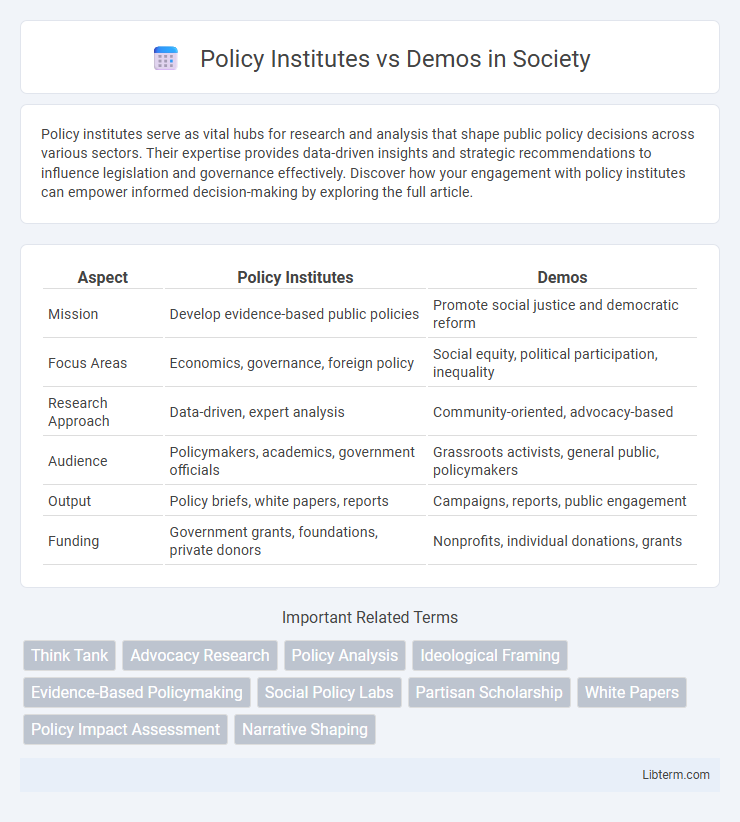Policy institutes serve as vital hubs for research and analysis that shape public policy decisions across various sectors. Their expertise provides data-driven insights and strategic recommendations to influence legislation and governance effectively. Discover how your engagement with policy institutes can empower informed decision-making by exploring the full article.
Table of Comparison
| Aspect | Policy Institutes | Demos |
|---|---|---|
| Mission | Develop evidence-based public policies | Promote social justice and democratic reform |
| Focus Areas | Economics, governance, foreign policy | Social equity, political participation, inequality |
| Research Approach | Data-driven, expert analysis | Community-oriented, advocacy-based |
| Audience | Policymakers, academics, government officials | Grassroots activists, general public, policymakers |
| Output | Policy briefs, white papers, reports | Campaigns, reports, public engagement |
| Funding | Government grants, foundations, private donors | Nonprofits, individual donations, grants |
Introduction to Policy Institutes and Demos
Policy institutes are research organizations dedicated to analyzing and proposing solutions for public policy challenges, often influencing government decisions through evidence-based studies. Demos is a prominent American think tank known for its progressive policy research, emphasizing issues such as economic inequality, democracy, and social justice. Both organizations contribute to the policy-making process, but Policy Institutes encompass a broader range of ideologies and topics, while Demos specializes in advancing policies that promote equity and democratic engagement.
Defining Policy Institutes: Roles and Functions
Policy institutes serve as research organizations that analyze public issues and develop evidence-based recommendations to influence government decisions and societal outcomes. They conduct rigorous policy research, produce reports, and facilitate expert discussions to shape legislative agendas and public discourse. These institutes often maintain nonpartisan stances to provide objective insights for policymakers and stakeholders.
What Are Demos?
Demos is a progressive policy institute and think tank based in the United States, dedicated to promoting economic and social equity through rigorous research and advocacy. It focuses on issues such as voting rights, racial justice, and economic opportunity, aiming to influence public policy and mobilize grassroots movements. Unlike traditional policy institutes that emphasize academic research, Demos combines data-driven analysis with community engagement to drive systemic change.
Historical Context and Evolution
Policy institutes emerged in the early 20th century as research organizations dedicated to shaping public policy through evidence-based analysis, while Demos was founded in 2000 as a progressive think tank focused on social justice and democratic reform. Over time, policy institutes have diversified in scope and methodology, often aligning with bipartisan agendas, whereas Demos has maintained a clear advocacy role emphasizing equity and civic engagement. The evolution of these entities reflects broader shifts in political discourse and the growing importance of specialized research in influencing government decisions.
Key Differences between Policy Institutes and Demos
Policy institutes primarily conduct in-depth research and provide expert analysis to influence government policies, while Demos focuses on public engagement and democratic participation to drive social change. Policy institutes often produce comprehensive reports and policy recommendations aimed at lawmakers and stakeholders, whereas Demos emphasizes community involvement and grassroots initiatives to empower citizens. The key difference lies in policy institutes' emphasis on academic rigor and policy formulation compared to Demos' dedication to democratic renewal and public discourse.
Research Methodologies and Approaches
Policy Institutes typically employ quantitative research methodologies, using large datasets and statistical analysis to inform evidence-based policy recommendations. Demos prioritizes qualitative approaches, such as case studies, focus groups, and participatory research, to capture diverse perspectives and social dynamics. Both utilize mixed methods but differ in emphasis, with Policy Institutes leaning towards empirical data and Demos focusing on narrative and contextual insights.
Impact on Public Policy and Decision-Making
Policy institutes like the Brookings Institution shape public policy through rigorous research and expert analysis, providing legislators with evidence-based recommendations that influence long-term decision-making. Demos emphasizes social and economic justice, aiming to impact public policy by mobilizing grassroots support and advocating for progressive reforms that address inequality. Both organizations significantly affect policy agendas, with policy institutes driving technical and academic discourse, while Demos injects community-centered perspectives into the legislative process.
Prominent Examples: Case Studies
Policy institutes such as the Brookings Institution and the Heritage Foundation provide rigorous, data-driven research with a focus on shaping government policies through detailed reports and expert analysis. Demos emphasizes advocacy and social justice, using case studies like its work on economic inequality and voting rights to highlight systemic challenges and influence progressive reforms. Comparative case studies reveal that while policy institutes often target policymakers with technical expertise, Demos mobilizes public engagement to drive legislative change.
Challenges and Criticisms
Policy institutes often face challenges related to perceived partisanship and funding transparency, which can undermine public trust and influence policy impact. Demos, a progressive think tank, experiences criticism for ideological bias and limited engagement with opposing viewpoints, potentially narrowing the scope of policy solutions. Both entities struggle with balancing academic rigor and advocacy, affecting their credibility and effectiveness in shaping public policy.
Future Trends and Collaborative Potential
Policy institutes are increasingly leveraging data analytics and AI to forecast future trends in governance and public policy, enhancing their ability to provide evidence-based recommendations. Demos focuses on inclusive policy innovation, fostering public engagement and collaborative solutions that address social inequalities. Both entities demonstrate significant collaborative potential by combining rigorous policy research with community-driven insights to shape adaptive, forward-looking strategies.
Policy Institutes Infographic

 libterm.com
libterm.com